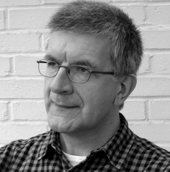
William Drenttel in the studio at Winterhouse. Image taken from Winterhouse: A Video by Andrew Sloat
I got to know Bill Drenttel a little by working with him on Design Observer, but many of the details I learned about his life, enthusiasms and career in design came from his essays for the site.
Bill was always modest and self-deprecating about these posts. In the early days, he wrote regularly for DO, though there was sometimes a sense, from the observations he made privately, that the writing was a struggle. I enjoyed his essays greatly and the same went for the often lengthy comments he added to his own and other writers’ posts. Bill was thoughtful, engaged, knowledgeable far beyond design, and deeply passionate about what he believed. He loved good writing and I found we had some favorite authors in common: the critic Susan Sontag (see his lovely tribute below) and the novelists Ian McEwan — an intriguing British surprise — and Paul Auster. Bill once made my evening by introducing me to Auster, who happened to be sitting nearby in a restaurant. It was a very Bill kind of moment, both networked and generous.
The 12 posts I have selected represent only a fraction of Bill’s writing for DO. They are a reminder of what is salted away in the archive and I hope they will inspire readers new and old to dip in. They cover his literary and intellectual interests, his education, his working life, his civic commitment, his bibliophilia, his curiosity, his sense of outrage (I once inadvertently found myself caught in his crosshairs — see “Whose Flag?”) and also, intimately bound to this militancy, his deeply held political convictions, which infuriated some DO visitors, not that this was ever going to stop him. Bill was a born campaigner, a social connector who needed to make things happen, and after 2008 most of his posts were written to publicize and support projects, awards and symposia initiated by Bill and Jessica at Winterhouse. I have to admit that I missed Bill the essayist. The earlier riffing on a theme took a back seat to organizational challenges, the furtherance of the causes he cared for, and the never-ending task of maintaining DO. These are hugely impressive achievements. Still, a lot of the man Bill was can be found, remembered and enjoyed in his essays.
The posts are listed in the order in which they were written. Those from DO’s early years lack images, which were lost during a site upgrade. I don’t think these lacunae harm the essays linked here, but some that I might otherwise have included were too dependent on images to work properly without them. I hope the pictures can be reinstated at some point.
Defamiliarization: A Personal History
How do we speak about graphic design? What is our critical vocabulary? I'm not proposing an answer to these questions here, yet on a number of occasions I have found myself returning to this theory, wondering if, in fact, there is something in the discipline of defamiliarization that might occasionally serve us well in design criticism.
Read more
My Country Is Not A Brand
Content should not be an abstraction for designers, but rather something to be evaluated in specific and differentiated terms. It is in its specificity that designers need to begin making distinctions — distinctions which are not merely programmatic or pragmatic, but which carry with them implicit moral dimensions.
Read more
In Remembrance of Susan Sontag
She listened in the same way that she read: acutely and closely. There was little patience for a weak argument. She assumed, often wrongly, that you possessed a general level of knowledge that would challenge even most college-educated professionals. She assumed you knew a lot and that you were interested in everything precisely because she was so interested in everything.
Read more
Chris Marker: La Jetée
In 28 short minutes, and a few hundred still images, La Jetée competes in my mind with the most dramatic three-part, six-hour science fiction epic that Hollywood can serve up.
Read more
Small Town Meetings
We live in Falls Village, Connecticut, the third smallest town in Connecticut with a population of 1,288. Some months ago, I attended a local zoning commission meeting to argue for a more modern approach to "home office" regulations. The previous regulations were vague and basically made our design business illegal, since we have more than family members working in our studio.
Read more
What Ever Happened to Half.com, Oregon?
Back in 1999, in its Netflix-like heyday, Half.com was hot. And then it did something quite remarkable. As a publicity stunt, it bought a town — somewhere in Oregon — and renamed it. This news made the wire services, The New York Times and Wired magazine. So what ever happened to Half.com, Oregon, the first dotcom city in the world?
Read more
One Man’s Literary Compass
I have seen many great rare book libraries, especially among members of The Grolier Club. But the libraries I most enjoy are working libraries, where the books have been used and cited and annotated — first editions marred with underlining, notes throughout their pages.
Read more
The Presidential Rash
Last August, George kept saying NO. NO withdrawal from Iraq. NO to Nancy Pelosi. NO to Patrick Fitzgerald. He had to say NO a couple of times to Dick, just to remind him who was in charge. He even said NO to Laura on the evening of August 13, 2006. So who would be surprised that he woke up with the International NO Symbol branded on his leg?
Read more
Stephen Doyle: A Few Words
There are other practitioners of this art but Stephen Doyle has always seemed to me to be the most obsessed with making individual words meaningful, even transcendent, in a graphic form. If Op-Ed art is the new public form, Stephen has a calling; he is the master of the word made meaningful.
Read more
I Was A Mad Man
And yes: the pitch was everything. I used to fly into two or three cities a week and give presentations which I only received an hour before at the airport. I'd be handed a reel and a dozen boards, an account executive or two, and together — with at least one "creative" in tow — our mission was to go sell whatever was in the bag.
Read more
Whose Flag?
Recently, I received a poster on a topic I care about, issued by an organization I respect. It's a call-for-entries for a flag design competition being hosted by Adbusters, on the topic of global citizenship. The jury consists of seven judges, four of whom are contributors to Design Observer, and all of whom are capable critics, respected in the field. The seven person jury, however, consists entirely of white men.
Read more
A Design-Oriented National Endowment for the Arts
Imagine a new Federal Artists Program under the NEA that supported collaboration between designers, artists and architects . . . The goal should simply be better federally-supported projects: not only spaces, buildings, bridges, murals, sculptures and monuments. But also tax forms, postage stamps, ballots, voting machines, government websites — and wind mill farms, car designs and highway signage systems.
Read more


Comments [6]
12.28.13
12:02
12.28.13
05:13
12.29.13
07:42
12.30.13
04:42
01.02.14
01:02
01.14.14
07:14